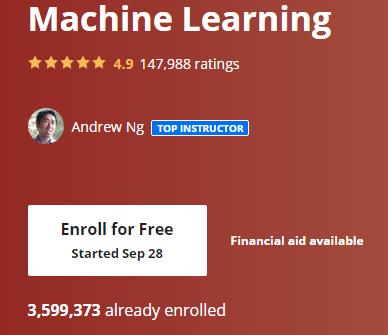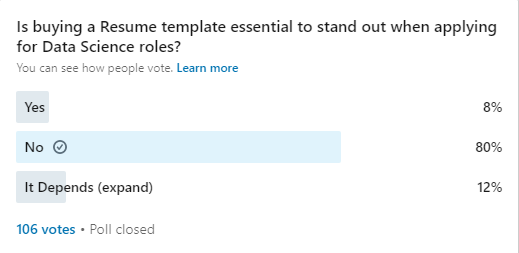Getting A Data Science Job is Harder Than Ever – How to turn that to your advantage
Although many aspiring Data Scientists are finding it is becoming more difficult to land a job than it was in previous years, understanding what has changed in the hiring landscape can be used to to your advantage in matching with the best organization for your goals and interests.
By Kurtis Pykes, AI Writer.
Photo by Martin Péchy on Unsplash.
As of writing this post, I am currently on the job hunt for a new role as a Data Scientist due to difficulties in correspondence to Covid-19 at my previous company.
This time around, I’ve noticed things seem to be much harder than they were when I was last was on the market, but instead of using these challenges to prolong our dreams of becoming a Data Scientist or end them in a worst case scenario, I’ve endeavored to better understand these challenges so I could come up with some solutions to make them work best in my favor, and now yours!
Outlandish Job Requirements
This seems to be a thread in most discussions I’ve had with Data Science job seekers —
Nobody feels qualified anymore.
Many Data Science Job descriptions do not communicate the actual requirements of the role being advertised.
One major effect of this is that aspiring Data Scientists who prioritize their personal and technical skills based on job descriptions would be mislead regarding the requirements to fulfill a role. Another issue with this is that recruiters would get plenty of applications that do not meet the requirements.
According to a fabulous post by Jeremie Harris titled The Problem With Data Science Job Postings, there are many reasons why a Job description may seem incomprehensible, and it’s down to you to distinguish what category the one you’re on falls in:
- Many ways to solve problems, so it is hard to narrow it down for a job description.
- New Data Science teams may encourage people to be a jack of all trades, which translates into the job description.
- The company lacks the experience to know what problems they have and what capabilities the person who can solve them should have.
- Written by recruiters.
Solution
Though it requires some discernment on your part, it is important to identify what the potential reason for an outlandish job description may be as some scenarios may be harmful to your growth as a Data Scientist, such as being a jack of all trades.
A great way to overcome this challenge is to acknowledge that Job Descriptions are merely a wish-list from the company, and they want to hire someone they believe has the ability to solve a real problem they actually have.
On that note, definitely go about displaying your ability in a way that allows others (the companies) to perceive you have what it takes to tackle their challenges. Additionally, if you meet at least 50% of requirements on any job description, then you’re probably qualified and should definitely attempt to go for the role — if you meet the job description 100%, you’re probably overqualified.
Data Science is becoming more Productionized
Being able to spin up a Jupyter Notebook and do some visualizations then build a model has worked in the past, but it’s no longer enough to get you noticed, in my opinion.
Jupyter Notebooks are great for conducting experiments, but when you get into the real world, there’s a point we move past the experimental phase. I believe it should be expected of every Data Scientist to know how to spin up a Jupyter Notebook, but as Data Science is becoming more productionized, bonus points are given to the Data Scientist that can write production-level code because you’ll be saving cost and time.
Here are 3 reasons every Data Scientist should know how to write production-level code:
- Things can get lost in translation from Data Scientist to Engineer.
- Eradicates the delay in the process.
- Killing 2 birds with 1 stone since one person can do 2 people’s job — makes you more valuable.
Solution
Although controversial, I believe the skills of a Data Scientist and a Software engineer are converging when it comes to product facing Data Science applications, so more Data Scientist should be learning about software engineering best practices.
Given you already know how to write production-level code, you may want to check out Schaun Wheeler post titled What does it mean to “Productionize” Data Science?, which exceptionally summarizes the focus of employment of systems beyond the code level best practices for Data Science productionization — a really interesting read to say the least.
“For something to be ‘in production’ means it is part of the pipeline from the business to its customers. […] In data science, if something is in production, it’s on the path to putting information in a place where it is consumed.”
Competition
Data Science is among the fastest growing and emerging technologies on the planet, and tons of people are flocking to update their skills to have a shot a making a career as a Data Scientist. And, just in-case you don’t believe me, over 3.5 million people have enrolled in Andrew Ng Machine Learning course (which is an important part of Data Science) on Coursera since its inception.

It’s the sexiest job of the 21st Century for a reason.
These days more and more people are trying to break into the field, so the jobs have huge competition. However, this doesn’t have to be a reason to decide not to look for jobs!
Solution
Yes, we ought to do more to stand out. However, according to a recent poll I took on my LinkedIn profile, this doesn’t necessarily mean having the most fancy looking CV.

Source: Kurtis Pykes LinkedIn.
Of course, having a great portfolio is a great way to stand out, yet what seems to be undefeated in increasing your chances of being handed an opportunity is reaching out to hiring managers or Data Scientist in senior roles in the places that you are applying for.
LinkedIn has made it so easy to find people who work at a particular company, and it should be made part of the job application process when applying for jobs.
Conclusion
The fact that it’s difficult to get a job in Data Science should never be the reason you don’t have one. There are many challenges you’ll face at any job in itself, and getting the job is just the qualification phase to see if the employers believe you are capable of facing the challenges and whether you believe the employers are whom you would like to be on your team. Always seek to improve yourself, don’t wait to be ready to apply because you may never feel ready, and don’t be afraid to be rejected or to reject companies that don’t align with where you are going.
Original. Reposted with permission.
Bio: Kurtis Pykes is passionate about harnessing the power of machine learning and data science to help people become more productive and effective.
Related:
